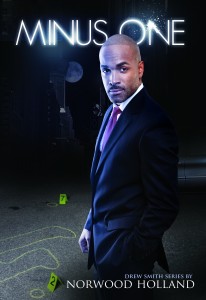Book Review: How Could My Husband Be Gay by Ondrea L. Davis and J’son M. Lee
October 20, 2011
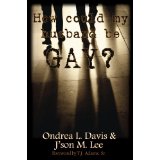 How Could My Husband Be Gay? is an autobiographical account of Ondrea L. Davis’ brief failed tumultuous marriage as penned by J’son M. Lee. There are three sides to every story, in this instant his, hers and the truth. Since this story presents only her side, the reader is forced to glean the truth from the facts given while questioning the authors’ motives for telling this deeply personal and painful story. This book is not intended to be a predictor of recognizable signs for determining or verifying suspicions of a gay husband. It is rather a moral tale of the consequences of deceit and deception.
How Could My Husband Be Gay? is an autobiographical account of Ondrea L. Davis’ brief failed tumultuous marriage as penned by J’son M. Lee. There are three sides to every story, in this instant his, hers and the truth. Since this story presents only her side, the reader is forced to glean the truth from the facts given while questioning the authors’ motives for telling this deeply personal and painful story. This book is not intended to be a predictor of recognizable signs for determining or verifying suspicions of a gay husband. It is rather a moral tale of the consequences of deceit and deception.
In the beginning the wedding offers hopes of a bright and beautiful future despite troubling signs. The groom and his mother both attempt to upstage the bride on her day. The author paints a picture of a self centered husband controlled by his mother and leading a double life. Supposedly a devout Christian his duties as husband and father become secondary to his own desires. The reader is taken on a journey including a blissful honeymoon; establishing a household, child birth and growing financial woes. Except for the husband’s homosexual tendencies this story would appear common to many marriages where one becomes disinterested and consequently withdrawn from the family. The difference here is this man’s interest lay with other men.
He finally confesses his homosexual life after the termination a marriage that seems to have lasted less than five years but long enough to produce three children. The husband’s flawed character becomes manifest when he’s convicted of fraud in his employment. Both in his domestic and work life he appears prone to deceit. The books clearest message can be found in the next to last paragraph:
“If we cannot be honest with ourselves and the person we choose to marry, we can never be genuinely happy. This is virtually impossible because our entire existence with that person would be built on a foundation of deceit. It is grossly unfair to our potential spouse and any children that are born of that union. It takes a real man (or woman) to think ahead and choose not to be the source of anguish, stress and regret for another person.”
Ondrea Davis’ reliance on faith and pastoral counseling only delays the marriage’s ultimate demise. Many single parents, husbands and wives alike may identify with her heartbreak and the experience of an unfaithful spouse who abandons the marriage. The authors do a good job of giving expression to that experience and for that purpose its recommended reading. But moreover I suspect it’s about settling a score absent forgiveness. Such a practice is generally frowned upon as it distracts from message and loses credibility and for whatever pleasure it brings the writer it can only do more harm to the family. 4 Stars
Disclaimer: This information and review are the opinions of the individual reviewer. Black Literature Magazine cannot be held accountable. The reviewer takes full responsibility for the information and opinions presented.
The Neighborhood by Brian C. Conley
October 20, 2011
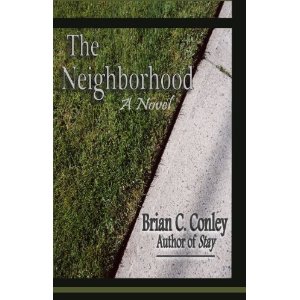 The Neighborhood Brian Conley’s second novel memorializes his old neighborhood Forest Heights Park in Baton Rouge Louisiana. It’s a fictional account–a combination of mystery and coming of age tale. The novel varies to some degree from the standard whodunit formula nevertheless it is full of colorful quirky characters and dysfunctional families. The first half is devoted to getting to know the victim 14 year old Bridget and her circle of friends particularly smitten suitors Deucy and Kyle. Bridget a lovely dark skin girl is Charles Thibadeaux’s daughter born out of wedlock to a woman not his wife but his true love. Bridget’s mother dies forcing Charles to bring her to live with his wife and two daughters of the approximate same age.
The Neighborhood Brian Conley’s second novel memorializes his old neighborhood Forest Heights Park in Baton Rouge Louisiana. It’s a fictional account–a combination of mystery and coming of age tale. The novel varies to some degree from the standard whodunit formula nevertheless it is full of colorful quirky characters and dysfunctional families. The first half is devoted to getting to know the victim 14 year old Bridget and her circle of friends particularly smitten suitors Deucy and Kyle. Bridget a lovely dark skin girl is Charles Thibadeaux’s daughter born out of wedlock to a woman not his wife but his true love. Bridget’s mother dies forcing Charles to bring her to live with his wife and two daughters of the approximate same age.
Charles Thibadeaux is a pillar of the community and by introducing his dark skin child into his perfectly blue vein bourgeois household it antagonizes his wife with dividing loyalties between their daughters. Like Cinderella dealing with an evil step mother and one evil step sister Bridget copes focused more on her desires for Kyle. With a discontent wife Charles Thibadeaux is driven to drink. Bridget’s celebrates her 14th birthday with a community pool party ending with her mysterious death. Vigilante neighbors go into action, secrets of past scandalous behavior are revealed while dredging up old resentments. The Neighborhood touches on themes of jealousy, sibling rivalries, colorism, and religious hypocrisy. Full of vivid details and richly drawn characters most of whom have issues Conley captures the experience of the provincial Southern African-American community and small town pathos.
The ability to use the different points of view is one measure of a person’s writing skill. While the general rule is for novels to adopt a single approach to point of view throughout, there are exceptions. Conley takes exception with perhaps too many points of view but when it comes to good writing he exhibits extraordinary skill as an evolving talent. The author does a great job, but I wonder how much better this tale would be with a cohesive narrative voice. There are currently too many young new writers publishing a too much pulp, but the cream rises to the top and Brian Conley on his way up. You can bet he won’t go unnoticed for long. I highly recommend The Neighborhood with great anticipation for his next. 5 Stars
Disclaimer: This information and review are the opinions of the individual reviewer. Black Literature Magazine cannot be held accountable. The reviewer takes full responsibility for the information and opinions presented.
The Warmth of Other Suns by Isabel Wilkerson
September 30, 2011
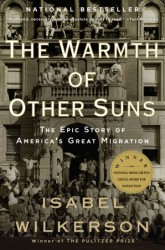
The Epic Story of America’s Great Migration is a testimony to the 20th Century African American struggle when the railroad to freedom was no longer underground but remaining for some a journey no less fraught with danger and resistance. Isabel Wilkerson painfully details the life stories of three migrants who escaped the oppression of the Jim Crow South. From 1915 to 1970 six million Blacks joined the exodus abandoning the confederate states for the promise of a better life elsewhere–most often northern industrial cities. It was a time of lynching, voter suppression, intimidation, systematic disenfranchisement, oppressive labor conditions and terrorism by lynching and bombings.
The title The Warmth of Other Suns is borrowed from Richard Wright’s quote
I was leaving the South to fling myself into the unknown. I was taking a part of the South to transplant in alien soil, to see if it could grow differently, if it could drink of new and cool rains, bend in strange winds, respond to the warmth of other suns, and, perhaps, to bloom. On a broad canvas Wilkerson paints a riveting and moving account of the racism and injustice faced by Blacks throughout the 20th Century and looking back one wonders what did Southern White America expect to gain from Jim Crowism. It ultimately hurt the South retarding its economic development.
Ida Mae Brandon Gladney, George Swanson Starling, and Robert Joseph Perching Foster, were from Mississippi, Florida, and Louisiana respectively. Ida Mae was a cotten picker, mother, sharecropper’s wife and later matriarch. Dr. Robert Joseph Perching Foster a graduate of Morehouse and Meharry escaped the boondocks and bayous to live out the high life he dreamed of but not without his own tales of woe discrimination and humiliation. George Swanson Starling a fruit picker whose labor organizing activities on behalf of blacks forced him to flee Florida with white vigilantes on his heels.
Wilkerson carries us through the life stories of the three sharing their hopes and dreams. We rejoice at their milestones and achievements, despair with their loss and challenges, and finally mourn their deaths. And what do we learn? According to one reviewer “if the Civil War was fought over black freedom, then it appeared during the decades following the war that the South won. Until World War I came along, that is. The Great War marked the beginning of one of the most important and under appreciated revolutions in American history.” We learn the stereotypes of Black Southerners invading northern cities corrupting communities was not so. They brought a strong work ethic, were at higher education level than northern Blacks and Whites, and overall maintained stable married households. If anything they were corrupted.
The Warmth of Others Suns is a scholarly study delivering a history lesson and told through the eyes and in the words of Americans discounted and devalued by white society throughout their lives. It’s a moral story we should never forget. Without such works like Wilkerson’s future generations may never know the full extent of the struggle suffered by those who came before us, and no doubt we stand on the shoulders of giants.
Seeking A Twitter Breakthrough
September 26, 2011
I’ve been waiting for a Twitter breakthrough when suddenly it all becomes crystal clear this Tweeting phenomenon. I opened a Twitter account three years ago. It lay fallow for the first two years. I would occasionally log in watch the Tweets and wonder why? The endless mundane comments surrounding the minutia of people’s ordinary uninteresting everyday lives all seemed like a waste of my time.
Obviously a generational thing as a Boomer the Millennial fad amounted to nothing more than nonsense. I had the same sentiments toward Facebook but that proved me wrong so I was willing to give it a chance. Facebook’s value revealed it power and purpose when I began to reconnect while my college pals and enjoyed the ability to correspond on a daily basis. Social Media had not impressed me until I attended a writer’s conference three years and heard the buzz about Social Media. It could help build your writer’s platform and your brand.
The Facebook breakthrough came early on. I soon launched a Kickstarter project to cover printing cost of my first novel. Facebook proved to be an incredible tool in attracting donors. Now the challenge becomes is to use Twitter to help develop a readership. Facebook offers greater advantages interacting with friends who have profiles and pictures aiding relationship building without the 140 character limitation. Twitter profiles are often vague, blank, or indistinct. You know very little about your followers.
I was befuddled as to how to build relationships and how Twitter would enhance my writer’s platform. Then about a year ago things began to change as I started to recognize relationships. I began to make a conscious effort and discovered the more time I was logged in, the more I observed and participated the more followers I attracted. The problem is finding your niche interest and followers with whom I had common interest. With a mere 200 followers I’m not there yet. I think its like swimming you just have to wade in and practice until you learn how to stay afloat.
I came to recognize the value of Twitter when it brought me face to face with a celebrity actor author whom I had admired and followed. Recently he tweeted he was doing a book signing at the Convention Center downtown. This was an opportunity I acted on immediately and came away thinking, wow, if only I could get people to come to my book signings on a moments notice that would be a breakthrough.
I have a twofold Twitter goal for the next year, (1) to build relationships with followers that will help promote my books, and (2) implement business and marketing strategies to get results. I will monitor my progress in terms of following and followers pursuing that breakthrough. Currently with 196 followers and 489 in a years time I hope to report the milestone and progress in pursuit of that breakthrough. Not only will I be staying afloat but doing laps.
The Colored Section of Bookstores
September 20, 2011
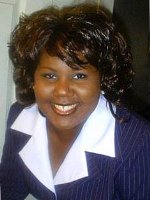
by Yolanda M. Johnson-Bryant the founder and CEO of Bryant Consulting. Her consulting firm provides a variety of services to new and established writers, including ghost writing, manuscript editing, character development, and marketing. See YolandaMJohnson.com
and LiteraryWonders.com
African-Americans have come a long way in the literary industry. More and more black authors are emerging onto the markets, be in via traditional publishing or self-publishing. This is good news to our authors and readers, but we have to admit—we have a long way to go.
As authors, we have made our mark in bookstores. Let me correct that—non African-American bookstores. Now, when a patron walks into a bookstore such as Borders, Barnes and Noble or even Wal-mart, a reader can find our section with ease; the “colored section” if you will.
No, this is not about race—not necessarily. This is more so about activism. Should our books have their own section in bookstores? Yes and no. A consumer should be able to walk into a bookstore and browse bookshelves by genre like they can any other book. By doing so, would close yet another notch in the belt of segregation.
However, the reality is that a lot of African-American authors would lose out if this was to happen; right now at least. Currently, when a reader learns of a new book by their favorite author, or a new author, it is so easy for them to head straight to the “colored section” to find the book they are looking for, and even then, there is no guarantee the book will be available.
Another frustrating factor of the “colored section” is the lack of variety of our books and the lack of quantity. Many bookstores may confine AA (African-American) books to one kiosk, or at best, a two-sided book shelf or corral. I often wonder how African-Americans would feel if this section was larger. Would we complain about the segregation of our books then? Perhaps so; but I get the feeling that there would be less complaints about the section, and more complaints about something else.
Could it be that African-Americans cringe at the thought of actually having to socialize amongst the proper folk and subject themselves to something outside of their comfort zone? This could be it, or perhaps another factor could be that we don’t want to take the time that it would take to saunter somewhere other than the “colored section” to find the book we are searching for. I’d say that all of the above might be true.
Earlier, I mentioned that this was not a matter of race but activism. Bookstores don’t get a free pass when it comes to the part they play in the “colored section” because they are guilty, guilty, guilty! Contemplate this: Just like we made our presence known in the literary industry, we can also make our presence known in bookstores and make our voices heard. Everywhere you look, there is a campaign for this or a campaign for that. Why not start a campaign to either make the “colored section” larger and with more variety or mixing our titles amongst the “house books” if you will.
Talk to your local bookstore managers and associates, write letters, start a Facebook page—something other than Like Me if You Like My Farmville Page. Let’s also hold publishers accountable for joining forces with authors and readers so we can do something about that little violation problem in bookstores. African-Americans will boycott a local restaurant because they didn’t have catfish on the menu, but won’t boycott a bookstore so that our books will have a better presence in their establishment.
By doing this, we challenge our readers to come in from the cotton fields and mingle in the country club, and at the same time, expanding our horizons. As African-Americans, we can no longer sit about and complain about things and do nothing about them. With the takeover of e-books and the closing of bookstores, our books will be diluted in the process. Take action or kindly put up your Baptist finger and excuse yourself.



